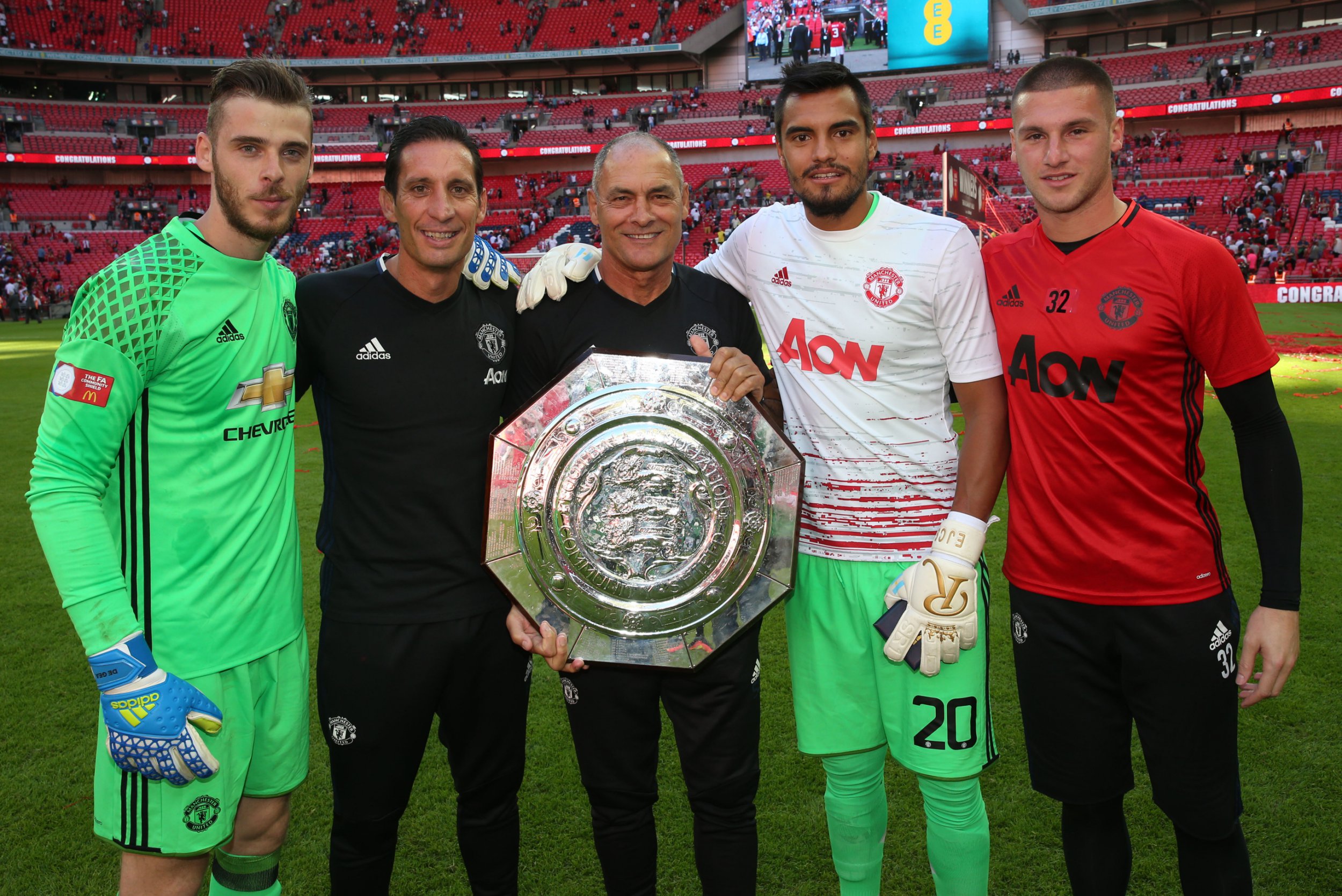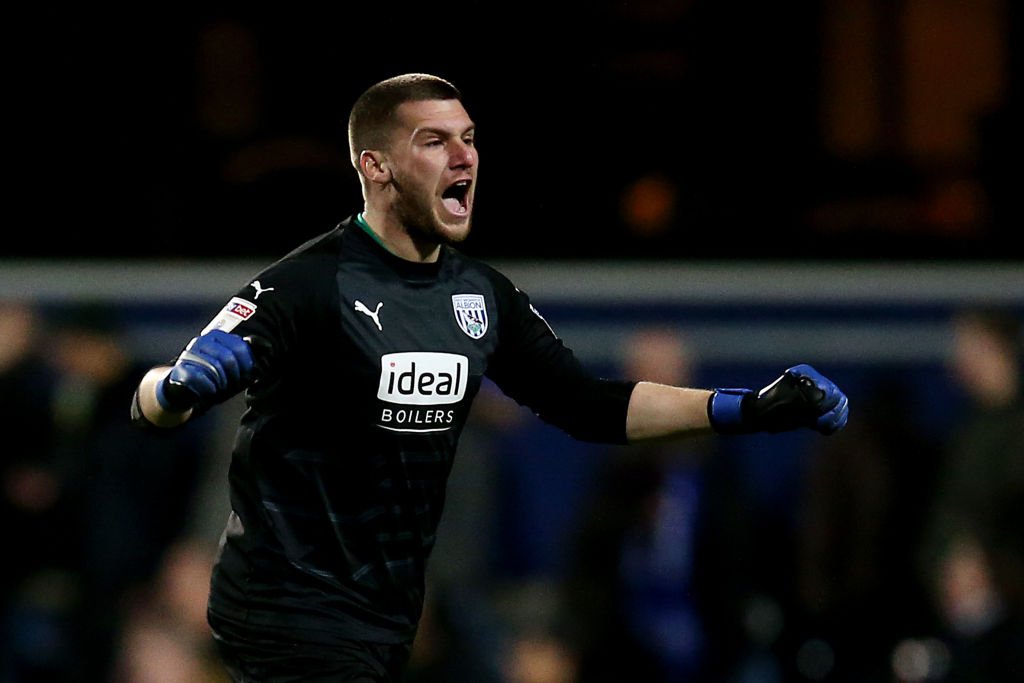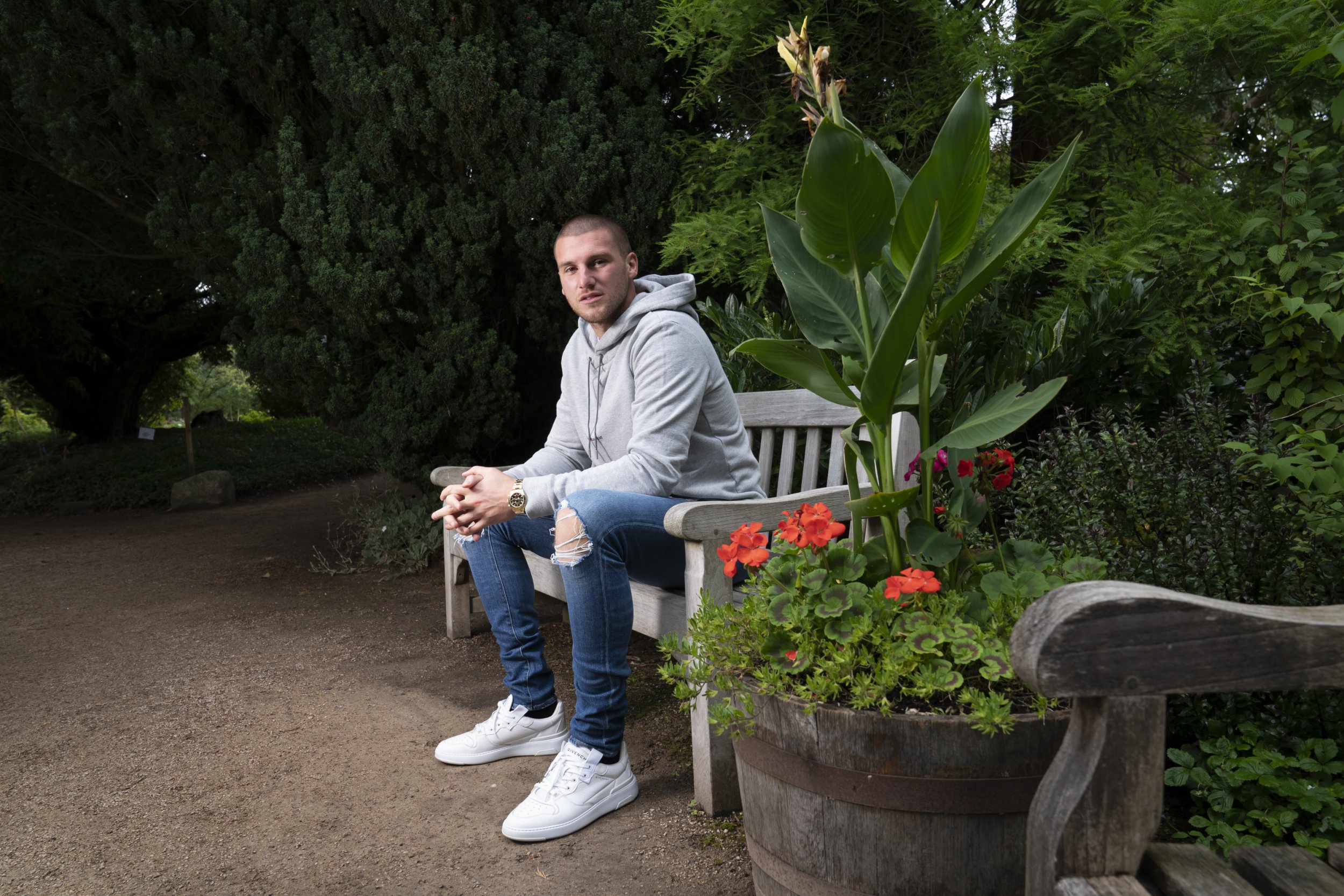Football is on the telly in Sam Johnstone’s house and his two-year-old son turns to him, pointing at the screen. “Daddy, kick-kick!” he says, pleased with himself.
“No, no, daddy’s not playing on the telly!” Johnstone replies. “Daddy’s here with you.”
The West Bromwich Albion goalkeeper laughs as he explains. “He thinks every football game is daddy. We got a box because he’s so young. He comes to games, he has a little West Brom kit.”
Fatherhood has changed Johnstone in ways that he could not previously imagine before his boy was born. “Before you have kids people say, ‘Oh it’s the best thing ever.’ You think: ‘Alright, okay, whatever.’ Then once it happens you’re like: ‘Yeah.’
“Family comes first. No matter what kind of day you’ve had you come home, you see your kids, your family, and it half takes the pain away. It changes your mood. They don’t know what day you’ve had, you’re dad coming home and that’s it, let’s play and have some fun. That’s been very good for me. I love spending time at home with them.”
Cohen is a left-footer, unlike dad. “I dunno where he’s got it from! Being a dad is good fun and gets better the older they get.
“I’m lucky my missus does a lot. To all the mums – and dads who are the main parent – out there I don’t know how they do it. It’s not an easy job. It’s constant: feeding, nappy changing, crying, sleeping, no sleep, there’s all sorts going on.”
Parenthood shaped Johnstone’s thinking during lockdown when he wanted to use his position to help others in a difficult time. He was born and raised in Preston and initially paid for meals and bottles of a specialist vitamin and protein drink to be distributed to local NHS and care home workers.

Next, he contacted West Brom asking if the club chef was still working. He was put in touch with Rob Lake, the foundation director, and said he wanted to provide meals for families in Birmingham who were struggling.
“When you have kids you don’t realise what a privileged position you’re in just being able to put food on the table. Some people can’t do it, at all.” They set up a system with local schools and West Brom agreed to match the cost of meals, doubling their reach.
To 61 schools they delivered more than 1,000 meals a week for six weeks. “Look at what Marcus Rashford’s done – getting the government to provide free school meals during the summer, it’s unbelievable,” Johnstone says. “Obviously this is no way near that scale, but it’s nice to help.
“When I was young and off school I was eating all the time. Kids just eat all day. If they’re not in school, some families just about manage to put meals on at breakfast or tea. It’s hard for some to cope.”
Speak to some footballers and you get the impression they really believe they are some kind of demigod, as opposed to skin and bones who will die like the rest of us. Speak to Johnstone and it is like you are sharing a pint with your mate in the pub. He is friendly, affable, funny and doesn’t take himself too seriously as he recounts his time in Manchester United’s academy.

He joined Manchester United when he was 10 years old and was in one of their most successful and fruitful year groups, playing alongside Jesse Lingard, Ravel Morisson, Will and Michael Keane and a little later Paul Pogba, when they signed the French midfielder.
Johnstone remembers the squad huddled together in Sir Alex Ferguson’s office while the Scot gave them a motivational speech before they won the FA Youth Cup in 2011. “He had time for everyone,” Johnstone says. “He knew everything about everyone. He was a top manager and top person. He was not just interested in the first team, he was for everyone: youth players, coaches, staff, in that building everyone was treated the same.”
Johnstone impressed goalkeeper coach Eric Steele and Richard Hartis, in charge of the academy keepers at the time and now senior coach under Ole Gunnar Solskjaer, and was fast-tracked into the first team. Unfortunately, a young Spanish goalkeeper called David De Gea had just signed for £20million.
Still, Johnstone was now in a dressing room and training daily with Rio Ferdinand, Ryan Giggs, Paul Scholes, Patrice Evra, Nemanja Vidic, Nani and De Gea. “As soon as Ferguson walked out on the training pitch it went up another 10 to 20 per cent,” Johnstone recalls. “He had that aura around him. If he wasn’t on the pitch he knew he had the players out there to drag the best out of each other and set the standard.”
Johnstone went on loans to Scunthrope, Walsall, Yeovil, Doncaster, Preston, Aston Villa, but all the while De Gea was performing as one of the best goalkeepers in the world.

“The next thing you’re in your 20s, you think: ‘Where’s the time gone?’”
Johnstone’s first actual transfer was only two years ago to West Brom, for £6.5m. Now 27, almost 10 years after standing on the cusp of Manchester United’s first team, he is finally set to become the Premier League goalkeeper he always knew he could be, after some agonising near misses.
“I got to the final of the Championship playoffs with Villa, lost. Moved to West Brom. Got to the semi-finals and Villa beat us. I couldn’t do a playoff again and neither could my family so I’m glad we got automatic promotion!”
Even that was a nervy, uncertain affair. A few weeks before play was suspended by the pandemic, West Brom were seven points clear of Leeds United at the top of the Championship and 13 ahead of third-place Brentford.
But the Championship is a brutal, unforgiving league. They finished the season 10 points behind champions Leeds and two ahead of Brentford, who lost their last two games of the season.

One thing the pandemic has highlighted is how important a celebration can be: for closure, for drawing a line between one point in time and another, for moving onto the next phase.
No fans were able to attend when West Brom did it, when they inched over the line at The Hawthorns with a draw against Queens Park Rangers. Some supporters hooted their car horns from the roads outside the stadium and blue smoke drifted over the Jeff Astle gates, but it was not the same.
“It didn’t feel real,” Johnstone says. “We’d gone up, there was no crowd, there was no party, there’s nowhere to go, the next thing I’m at home. That’s it. Done. It was a weird feeling.”
The biggest blow was that little Cohen and the rest of his family who have followed him everywhere were not able to be there.
“You want your fans there, you want your family there, you want your friends there, who’ve been in it with you. Your family come to every single game, the playoffs, you lose, the playoffs, you lose again. Now I do it automatically it would’ve been nice to have them there. They were like: ‘If you do it without us there it’s not a problem, get up, get promoted.’

“There were celebrations over FaceTime and stuff like that. I don’t want to sound like there aren’t bigger problems in the world. We’ve done it, finally, just about, but we’ve done it. Let’s celebrate, enjoy it, then get ready for next year. But we’ve done it, celebrated a bit amongst ourselves, went back to the hotel, had a few drinks between ourselves, then home the next day and wait until we came back in.”
It sunk in deeper when they returned to pre-season training, a little deeper when they used the Premier League’s Nike balls for the first time, a little more when the fixtures were announced and they were pitched against Leicester City at home on Sunday, Premier League winners four years ago, almost qualified for the Champions League last season, home of Jamie Vardy, the Golden Boot incumbent.
“It’ll sink in more when we’re actually playing. We have to be fearless. We’ve got to do our own thing and try to win games. The aim is to stay up, stay in the Premier League, progress and build. There are times we’ll have to really dig in, just keep going, keep going. It’s a long season.”
Johnstone hopes the extra exposure and facing shots from the world’s best forwards can propel him into Gareth Southgate’s England squad.
The form of England No 1 and Everton goalkeeper Jordan Pickford has been shaky and Johnstone has seen Burnley stopper Nick Pope, who was pipped to the Golden Glove by Manchester City’s Ederson on the final day last season, and Dean Henderson, the Manchester United goalkeeper who impressed on loan at Sheffield United, earn call-ups.
“First of all, I have to do well for West Brom. There are going to be people at games, people watching, things will be highlighted more, one way or another, positively or negatively.
“Southgate is open, it’s not the same names every week, it’s whoever is performing every week. You look at the likes of Nick Pope, he’s doing unbelievably well in the squad. I want to do that. I want to do well and impress people and be in his thoughts of getting called up.”
Who knows, if all goes to plan, one day Cohen will point to the telly when an England game is on and say, “Daddy, kick-kick!”, and Johnstone will not be by his side watching but on the screen playing.
Sam Cunningham’s i football column is published in print and online on Tuesday mornings. You can follow him on Twitter @samcunningham
More from Sam Cunningham
- Arsenal’s players should ask for their money back after Kroenke’s £325m windfall
- Milner exclusive: On Liverpool, being ‘boring’ and Klopp’s hot-tub selfies
- Terry Butcher urges people to talk as he opens up about loss of his son
- The rise of Hashtag United: from YouTube kickabouts to EFL talent factory
- How English football could learn from the NBA


I'm a cafe owner - this is why the £5 coffee is inevitable